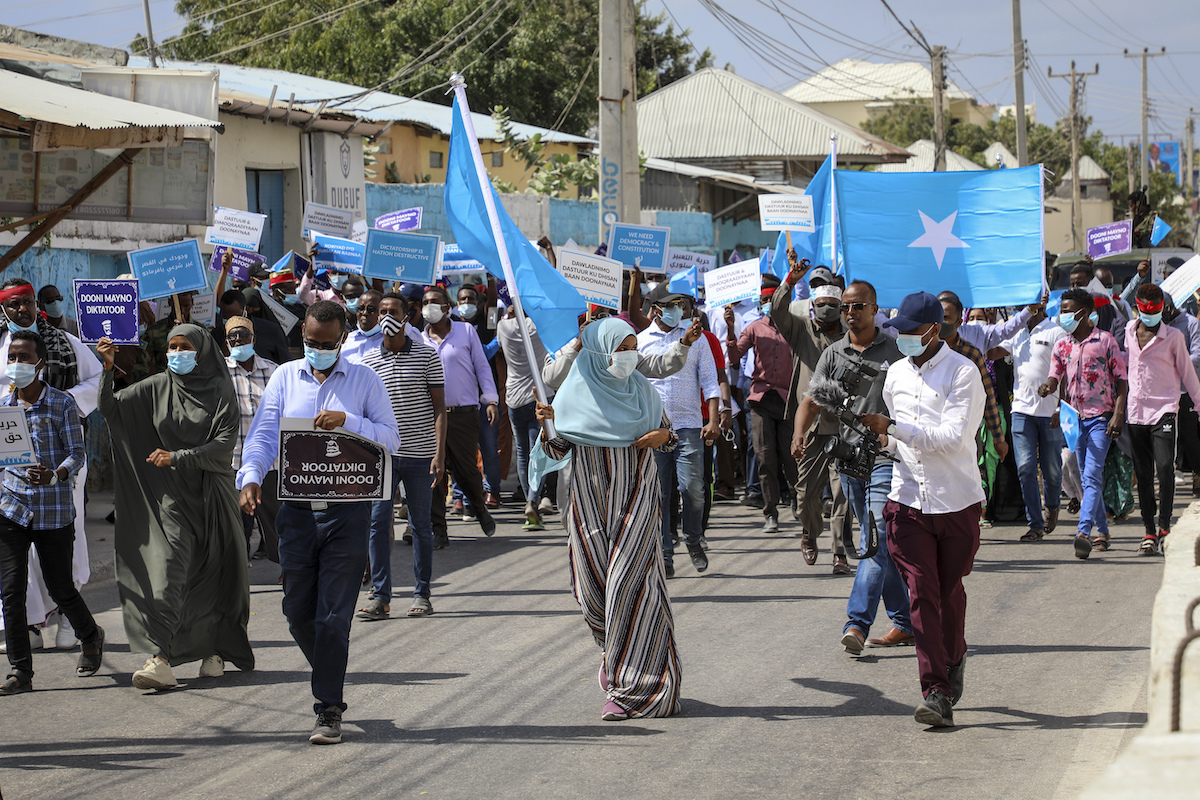Gunfire was exchanged between government troops and opposition supporters on Feb. 19 in the Somali capital of Mogadishu during a government protest, according to Reuters.
Protests have emerged following disputes over the presidential election that was supposed to be held by Feb. 8. The president and leaders of the country’s federal states failed to agree on how elections could take place.
“For quite some time now we’ve been back and forth around finding political solutions around the pending elections. Unfortunately, until today we don’t have a consensus on a political election model that all stakeholders are happy with,” said Hodan Ali, co-founder of LeadNow, a Somali women’s political pressure group.
Opposition groups and supporters blame current Somali president Mohamed Abdullahi Farmaajo for the inability to come to a consensus.
“The president is solely responsible for the delay to the election,” said opposition Senator Ilyas Ali, according to Al Jazeera. “He had four years to organise an election but he didn’t do that. Now, his term has ended. We don’t recognise him—and he only has himself to blame.”
Somalia currently has clan elders indirectly elect the country’s upper house members while the members of the five federal states elect the upper house. Both houses work to pick a president who then selects a prime minister.
“It’s not the first time actually that election is delayed from its date, but this time what is happening is this delay is coming [at] a time where there’s no agreement on a model,” said Hussein Sheikh Ali, founder and chairman of the Hiraal Institute think tank.
“Somalia—although known as a failed fragile country—has had some success in terms of power exchanging hands peacefully,” Ali said. “This is the first time that is under threat.”
The current presidential administration has been vowing to hold direct one-person, one-vote elections for over three years. This has only occurred once in Somalia since it gained independence in 1960.
“The government was over-ambitious when it made this assertion, with regards to context on the ground and prevailing political conditions including the push and pull between the centre and periphery,” analyst Abdimalik Abdullah said, according to Al Jazeera. “It was clear right from the onset that one-person, one-vote was largely not viable.”
On Feb. 19, hundreds of people protesting the election delay faced gunfire from Somali security forces.
“Some have died and others were wounded,” said former prime minister and presidential candidate, Hassan Ali Khaire, according to AP News.
A health care worker in Mogadishu said at least five soldiers were killed and more than 12 people, mostly civilians, were wounded during protests.
“Today security forces opened fire against us as we held a peace rally in Mogadishu,” Khaire said. “This happened as the event has been widely watched in the media here and in the world.”
The current administration claims that a protester fired first.
“Armed militia attacked government forces. We repulsed and overpowered the militias,” Security Minister Hassan Hundubey Jimale said in a statement.
“Every citizen has the right to demonstrate peacefully and for the security forces to be the ones to guard demonstrators and ensure their safety,” said current Prime Minister Mohamed Hossein Robley. “But we will not accept demonstrations guarded by forces outside the state apparatus which is unacceptable.”
Before the demonstrations occurred on Feb. 19, former government leaders accused government troops of attacking a hotel where they were staying.
“Farmaajo attacked us with armored vehicles. That is dictatorship,” former president Sheikh Sharif Sheikh Ahmed said, according to Reuters. “He attacked us and residents at Maida hotel. We ask all citizens to come out and respond.”
The United Nations has declined to assert whether Farmaajo has the right to remain in power until elections can be decided on.
“It is not for the United Nations in any setting to anoint a government declared legitimate or non-legitimate [sic],” said UN Spokesperson Stephane Dujarric. “There are institutions that are in place that have been agreed to, that have been negotiated,”We believe that Somali political leaders need to come together.”
Opposition argues that Farmaajo’s authority has become invalid after the Feb. 8 election deadline.
“Having had four years to prepare the ground for elections, Farmajo really hasn’t presented any kind of plan or proposal or done any work, which is what led us to this very dangerous political and constitutional crisis at the moment,” said Horn of Africa expert Matthew Bryden. “I’m afraid the balance sheet weighs heavily against President Farmajo. There’s very little in his favor.”i
